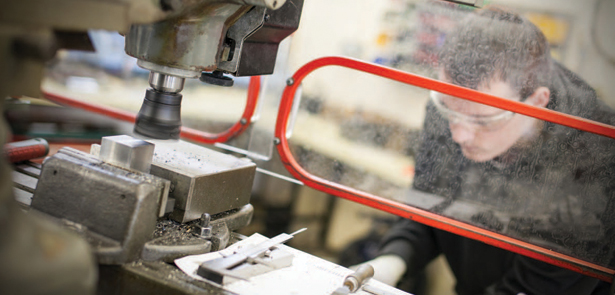Greater Peterborough University Technical College (UTC)

In September 2016, Greater Peterborough University Technical College opens its doors to students fo the first time. Toby Venables talks to Principal Alan McMurdo about the latest addition to Peterborough’s educational landscape – and how it plugs directly into business
FIRST OF ALL, HOW AND WHY DID GPUTC COME ABOUT?
Greater Peterborough University Technical College is basically a response to observations and pressure from local business and industry, who told us that youngters in the immediate vicinity – the city, and the counties around – weren’t getting the kind of education that delivered workready young people with the specialist skills for the workplace. There’s also a national movement – there are about 35 UTCs, and the number is growing all the time. They aim to address the national skills shortage, which is particularly acute in terms of engineering and built-environment skills.
IT’S RARE THAT AN EDUCATIONAL ESTABLISHMENT IS SO CLOSELY CONNECTED TO BUSINESS AND INDUSTRY – HOW DO YOU ENSURE IT’S DOING WHAT BUSINESS NEEDS IT TO DO?
The structure of a UTC is rather like a school. The board of governors at a school has local accountability, and our trust board also has local accountatibility duties, but is plugged directly into local business as well. Our two main sponsors, Larkfleet Group and Anglian Water, are represented on the trust board, and we’ve got Anglia Ruskin University and Peterborough Regional College on the board too. Then, underneath that, we have a whole swathe of business partners, which is an ever-growing number – companies who just want to be involved, and work with the young people. Crucially, for them, they get an eye on talented young people who are coming through Key Stage 4 and the sixth form, and get an early look at recruiting talented engineers and people in the built environment. So, there’s a structural element. The second thing to emphasise is our curriculum. Although our curriculum delivers the English Baccalaureate and all the standard qualifications, a lot of the teaching is through real-life employer projects. For example, we’re developing one with Anglian Water in which the students will be working on the supply of fresh water into a town in Cambridgeshire. The third and final part is placement in business and industry, getting our youngsters out into the workplace, presenting them at the ages of 16 or 18 as ready for work. An exciting package – and unique, really.
YOU HAVE THE WORD ‘UNIVERSITY’ IN THE TITLE, BUT STUDENTS CAN ACTUALLY START AT THE AGE OF 14. IS THIS ESSENTIALLY ADDRESSING THE LOSS OF APPRENTICESHIPS?
Very much so. I’ve been in education over 35 years, and we have gradually dismantled technical education. 40 years ago, the German government, in a three-way partnership with industry and, critically, the unions, put in place a system that has academic, vocational and technical strands. We’ve done OK with vocational – if you want to learn with your hands, you can come to somewhere like Peterborough Regional College. If you want academic, then you stay at school and head to university. But we’ve lost that technical bit in the middle; if you want to learn with your head and your hands, there’s precious little for you. I meet lots of parents now who say: ‘Where has this been for the past few years? Why haven’t we had this all along?’ They remember technical education, or going to night school to further themselves. Essentially, the UTC movement has come to plug that gap, giving youngsters intellectual challenges and practical, hands-on stuff as well. The university link is that all UTCs have a partner university. Ours is Anglia Ruskin, and I’m delighted it’s them, because they have a really broad view of technical education and how we can deliver and accredit that at university level. For instance, thet have a fantastic engineering faculty, and a great built environment provision. Our students can spend a day at Anglia Ruskin University doing surveying, for example. They can learn the skill, and apply the skills, and although it’s provided by a university it’s totally appropriate for 15 and 16-yearolds. We’re not contriving a university link just for the sake of it.
WHAT DOES GPUTC BRING TO CITY OF PETERBOROUGH?
We’ve worked hard at making our offer unique. We’re not treading on the toes of schools or the Regional College, and you have to go many miles before you find a similar curriculum offer – and by that I mean a Key Stage school where you come in year 10 and there are English Baccalaureate subjects as well as specialist qualifications. Then there’s the chance to do technical Baccalaureates in the sixth form, or an extended technical programme alongside A-level. So, it’s a unique school in the area in that sense. Because of that, parents and young people have additional choice. Once we get that bit right, we start to solve the skills shortage, and start feeding folk into local industry so they can fulfill their potential. At Anglian Water, for example, around a third of their engineering staff are retiring in the next ten years. We also work with Perkins, and they’re really keen to recruit quality youngsters. The apprentice programme that runs through Peterborough Regional College is always on the lookout for talented young people. So, we feel we’re offering something unique to kids and parents, and plugging into Peterborough as a leading edge environmental and engineering city. All the development around Peterborough and Cambridge down to Stansted can’t happen without a supply of talented youngsters coming into the employment market.
OF COURSE, IT’S NOT JUST ‘PETERBOROUGH’ BUT ‘GREATER PETERBOROUGH’… DOES THIS HELP BRING THE REGION TOGETHER?
There’s a UTC south of Cambridge that we work with, and the region is becoming a technical powerhouse. With Cambridge University well established Cambridge always had an academic edge, but employers have been telling us for a number of years that we need more technical skills in the region. But these are exciting times, with things happening in synergy across the area. I sense there’s a realisation that a centre of technical expertise is where Peterborough sees itself, and that there’s nothing wrong with that. We’re doing our bit. And the productivity and growth within Peterborough is astonishing.
PETERBOROUGH HAS A LONG HISTORY OF ENGINEERING EXCELLENCE, SO IT SEEMS A VERY LOGICAL FIT…
We can be proud of that history. But our challenge is also keeping the engineering curriculum as broad as we can, as well as exciting and up to date. It encompasses everything from engineering joints of the human body to building bridges over vast swathes of ocean. And the level of investment by the government to make this happen is heartening. We have £10million investment with lots of specialist equipment that we’ll be putting in over the next year, so when we open in 2016 we’ll have equipment you won’t be able to lay your hands on in an ordinary school.
TO FIND OUT MORE, GO TO GPUTC.COM















